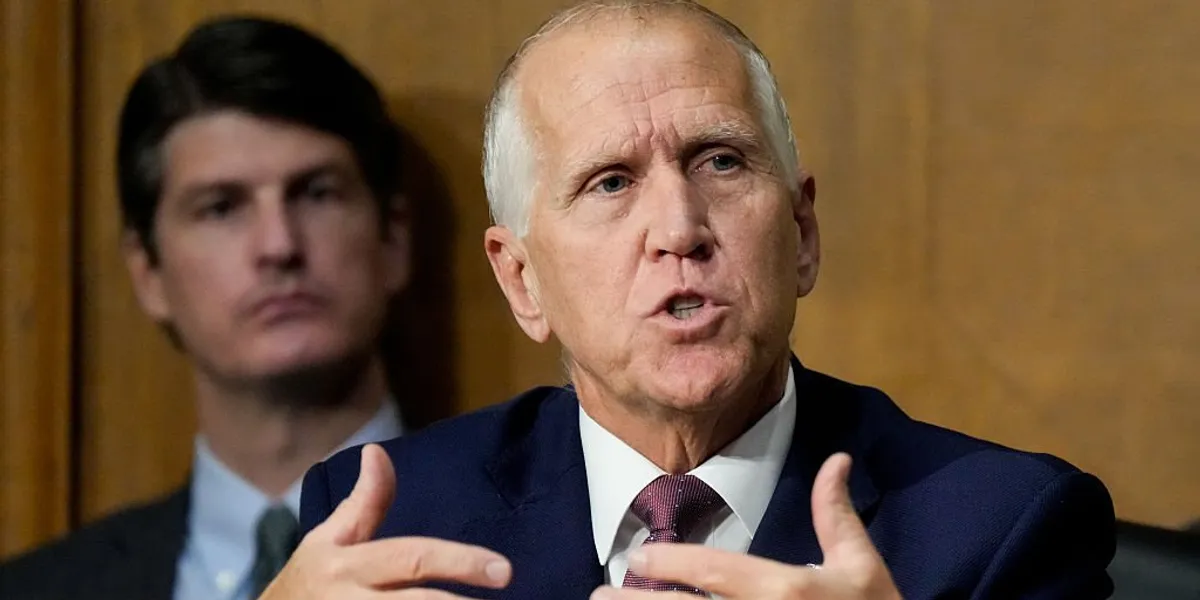
Senate Republicans worked over the last weekend of June to secure the votes necessary to advance the bill under the budget reconciliation process, which allows legislation to be passed with a simple majority. On Monday morning, it was time for the vote-a-rama, during which senators can offer unlimited amendments on said legislation. The debates typically last all night, and this one was no exception, with senators voting for about 27 hours in total, well into Tuesday morning.
And while senators were offering and debating amendments, leadership was working to secure votes. Even with Vice President J.D. Vance available to break any 50-50 ties, Republicans could afford just three defections—and there were four “no” votes when the amendment process commenced Monday morning. Sens. Susan Collins of Maine and Thom Tillis of North Carolina were firmly opposed to the bill, citing provisions related to Medicaid that they feared would harm their constituents. Sen. Rand Paul of Kentucky was open to voting for the legislation if leadership agreed to lower the increase to the statutory debt limit—the legal limit on how much the federal government can borrow—from $5 trillion to $500 billion, but Republican leaders weren’t interested in that fight. Instead, they focused their efforts on flipping Sen. Lisa Murkowski of Alaska.
The longtime senator and GOP moderate was concerned about her constituents losing access to Medicaid and the Supplemental Nutrition Assistance Program (SNAP), which helps low-income Americans purchase food. Eventually, the chamber’s leadership added provisions that satisfied Murkowski, including a $50 billion fund for rural hospitals across the country and an item that would insulate Alaska and other states with high SNAP error rates from some of the impacts of the changes to that program. That cleared the way for the Senate to pass the measure around noon on Tuesday.
In a statement following the vote, Murkowski touted these changes to the bill but also criticized the “awful process” of passing it as “a frantic rush to meet an artificial deadline.” She urged the House of Representatives not to pass the Senate version. “My sincere hope is that this is not the final product,” her statement read. “This bill needs more work across chambers and is not ready for the President’s desk. We need to work together to get this right.”
But House Speaker Mike Johnson had other plans. Right after the Senate passed its version of the bill, he and his fellow House GOP leaders released a joint statement vowing that the House would “work quickly” to get the legislation through the lower chamber. As usual, though, he had to bring to consensus both moderates and spending hawks such as those in the House Freedom Caucus.
The revised bill that was returning from the Senate made navigating the maze in the House much harder for Johnson. The legislation upset moderates by making more drastic changes to Medicaid than those outlined in the original House bill, and it angered fiscal hardliners by stripping out some of their proposed spending cuts that did not comply with Senate reconciliation rules.
As usual, the Freedom Caucus members were the most vocal in their opposition. While they were unhappy with the Senate’s provision protecting some green energy subsidies passed under President Joe Biden, their biggest complaint was that the upper chamber’s bill did not meet the topline figures they had agreed upon in the budget resolution from earlier in the year. The original blueprint called for $2 trillion in spending cuts over 10 years to partially offset $4.5 trillion in lost revenue over the same period due to the extension of the 2017 tax cuts. Instead, while estimates vary, the Senate bill that became law cuts somewhere in the neighborhood of $1.2-$1.4 trillion in spending and results in $4.5 trillion in tax cuts, adding around $3.3 trillion to the national debt over the next decade—not particularly close to the House framework.
That was the state of play as Johnson scheduled a vote on the bill for Wednesday. “We are working through everybody’s issues and making sure that we can secure this vote,” he told reporters going into a procedural vote that would determine whether the bill had enough support to pass. “I feel very positive about the progress. We’ve had lots of great conversations. I’ve met with individuals and groups all day long, as has the president, who’s fully engaged as well, trying to convince everybody this is the very best product that we can produce.”
But Republican House leaders stalled on Wednesday afternoon while they, along with Trump, worked on the holdouts before that vote to advance the bill. Eventually, they had to tell members to return to their offices while they continued lobbying.
The House leadership called members back Wednesday night for that procedural vote, and they still had some holdouts among both moderates and hardliners. In the early hours of Thursday morning, all Republicans voted to move forward with the bill except for moderate Rep. Brian Fitzpatrick, who represents a swing district in Pennsylvania.
Despite some last-minute delay tactics from House Minority Leader Hakeem Jeffries—who used a privilege that allows House leaders to speak on the floor as long as they want, setting the record for the longest speech in the chamber’s history at eight hours and 45 minutes—Republicans voted 218-214 to pass the bill, with Fitzpatrick and Rep. Thomas Massie of Kentucky, who opposed pretty much every step in this process on fiscal grounds, the only two Republican no votes. Trump signed the bill into law at the White House the next day.
But the question remains: Why did the hardliners opposed to the bill—and who insisted they would not vote for it—flip? Rep. Ralph Norman of South Carolina, for example, voted against advancing the bill in committee early Wednesday morning and remained a “no” until after he met with Trump later that day. Speaking to reporters, Norman said Trump had swayed him, but he would not explain exactly how. He and his colleagues found out “things that were going to happen which will affect the whole country in a good way,” Norman said. “We found out that some things on the, like, illegals not voting—there’s going to be some things in place.”
Rep. Chip Roy of Texas spoke with reporters at length following the bill’s passage. Though he was a bit guarded on specifics, he cited a few factors that won his support, including a fear that sending the bill back to the Senate might not yield the improvements he wanted, assurances from the administration that it could undermine through executive actions some of the protections for green energy subsidies in the Senate version, and the potential for more spending cuts in forthcoming reconciliation bills.
“Future reconciliation packages are helpful, but the biggest thing is more about executive action to, I think, ameliorate the damage that, I think the additional amendment that was added on the ‘Green New Scam’—the 11th hour, what the Senate did,” Roy said. “I think we’ve gotten to a pretty good place, what the administration can do on that.” He also praised the Medicaid changes, such as those to the provider tax system, that went further in the Senate bill than the original House bill.
Roy pushed back on criticisms that the Freedom Caucus caved in this process and insisted its members’ “yes” votes did not hurt the group’s credibility, arguing that their obstinance made the bill more conservative than it would otherwise have been. He noted his and others’ votes against the original House bill in the Budget Committee in May, as well as the caucus being a thorn in the side of former Speaker Kevin McCarthy and its holding up other legislative measures.
“You know many freaking people are frustrated because we’ve taken down rules? We’ve had motions to vacate. How many things do we have to do for it to be like, ‘Well, yeah, those guys actually mean what they say,’” he told TMD. “The question here is what you’re going to do and what you get for it. That’s it. And if you feel like you move the needle and you get stuff for it, then maybe you should take the wins.”



